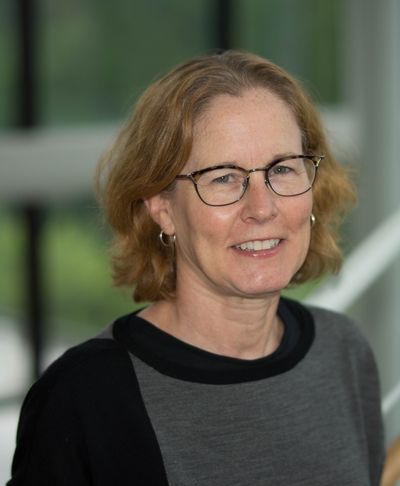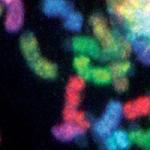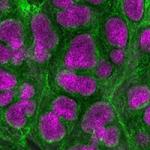
Research Topics
In humans and other eukaryotes, chromosomes reside within the nucleus, a structure surrounded by the double membranes of the nuclear envelope (NE). This organization has profound consequences for gene expression and cell function. The machinery that mediates communication between these compartments thus sits at a crossroads for many pathways of cell regulation and control. Communication between the nucleus and cytoplasm across the NE occurs through conduits called nuclear pore complexes (NPCs), which consist of about 35 proteins called nucleoporins. Beyond nucleocytoplasmic trafficking, nucleoporins are important for chromosome organization, transcriptional control, RNA processing, cell signaling, and cell-cycle control. Moreover, disruption of nucleoporin function can have important clinical implications: nucleoporin genes are frequently mis-regulated in cancers, and nucleoporin mutations cause congenital defects. Interestingly, nucleoporin disruption is linked to phenotypes with a surprisingly high level of tissue specificity.
Our research focuses on understanding the nuclear transport machinery and its impact on processes that are essential for human health. We seek to define the biochemical roles of individual nucleoporins. To assess their role, we adapted auxin-induced degron (AID) strategies for selective and rapid degradation of individual proteins in human tissue-culture cells. This has allowed us to rapidly assess their roles in NPC structure as well as various facets of cellular function. We have also begun to use additional systems, Drosophila and mouse genetics, to monitor how NPCs change during tissue development and to assess clinically relevant nucleoporin phenotypes that are tissues-specific, including nucleoporin roles in the male germline as well as in the glomerulus of the kidney.
Biography
Mary Dasso is a Senior Investigator in the Division of Intramural Research, National Institute of Child Health and Human Development (NICHD-DIR). Dr. Dasso received her BA in Chemistry from the Clark Honors College at the University of Oregon. She was awarded a Marshall Scholarship to study at the University of Cambridge. After receiving her PhD in Biochemistry, she was awarded a Damon Runyon Postdoctoral Fellowship to work at the University of California, San Diego. She then moved to the NICHD-DIR, where she continues to lead a highly active research group. Dr. Dasso’s studies focus on non-canonical roles of the nuclear transport machinery. Proteins of the nuclear pore complex (nucleoporins) have been implicated in cellular functions beyond nucleocytoplasmic transport, including chromosome organization, gene expression, cell signaling and cell-cycle control. Understanding the activities of individual nucleoporins has been historically difficult because of their multifaceted nature, abundance, and unusual stability. To overcome these issues, she developed human tissue-culture cells that allow conditional depletions of individual nucleoporins, and used this system to define the mechanisms through which individual nucleoporins contribute to nuclear pore structure, nuclear trafficking, gene expression and development. She is currently investigating tissue-specific roles of nucleoporins, with the hope of understanding how disruption of nucleoporin functions causes genetic diseases and neurodegenerative conditions.
Beyond her own laboratory, Dr. Dasso has held a variety of leadership positions; she currently serves as Associate Scientific Director, Division of Cell and Molecular Biology, NICHD-DIR, and as a Scientific Co-Director, NIH Oxford/Cambridge Graduate Partnership Program. She has received numerous awards in recognition of her accomplishments, including a 2020 NIH Director’s Award and a 2021 NICHD Merit Award and the 2024 Masur Senior Leadership Award from the American Society for Cell Biology (ASCB). She is a fellow of the American Society for Biochemistry and Molecular Biology (2026), American Society for Cell Biology (2019) and the American Association for the Advancement of Science (2018).
Selected Publications
- Aksenova V, Arnaoutov A, Dasso M. Analysis of Nucleoporin Function Using Inducible Degron Techniques. Methods Mol Biol. 2022;2502:129-150.
- Chen S, Lyanguzova M, Kaufhold R, Plevock Haase KM, Lee H, Arnaoutov A, Dasso M. Association of RanGAP to nuclear pore complex component, RanBP2/Nup358, is required for pupal development in Drosophila. Cell Rep. 2021;37(13):110151.
- Schuller AP, Wojtynek M, Mankus D, Tatli M, Kronenberg-Tenga R, Regmi SG, Dip PV, Lytton-Jean AKR, Brignole EJ, Dasso M, Weis K, Medalia O, Schwartz TU. The cellular environment shapes the nuclear pore complex architecture. Nature. 2021;598(7882):667-671.
- Aksenova V, Smith A, Lee H, Bhat P, Esnault C, Chen S, Iben J, Kaufhold R, Yau KC, Echeverria C, Fontoura B, Arnaoutov A, Dasso M. Nucleoporin TPR is an integral component of the TREX-2 mRNA export pathway. Nat Commun. 2020;11(1):4577.
- Arnaoutov A, Lee H, Plevock Haase K, Aksenova V, Jarnik M, Oliver B, Serpe M, Dasso M. IRBIT Directs Differentiation of Intestinal Stem Cell Progeny to Maintain Tissue Homeostasis. iScience. 2020;23(3):100954.
Related Scientific Focus Areas


Molecular Biology and Biochemistry
View additional Principal Investigators in Molecular Biology and Biochemistry



This page was last updated on Friday, January 16, 2026